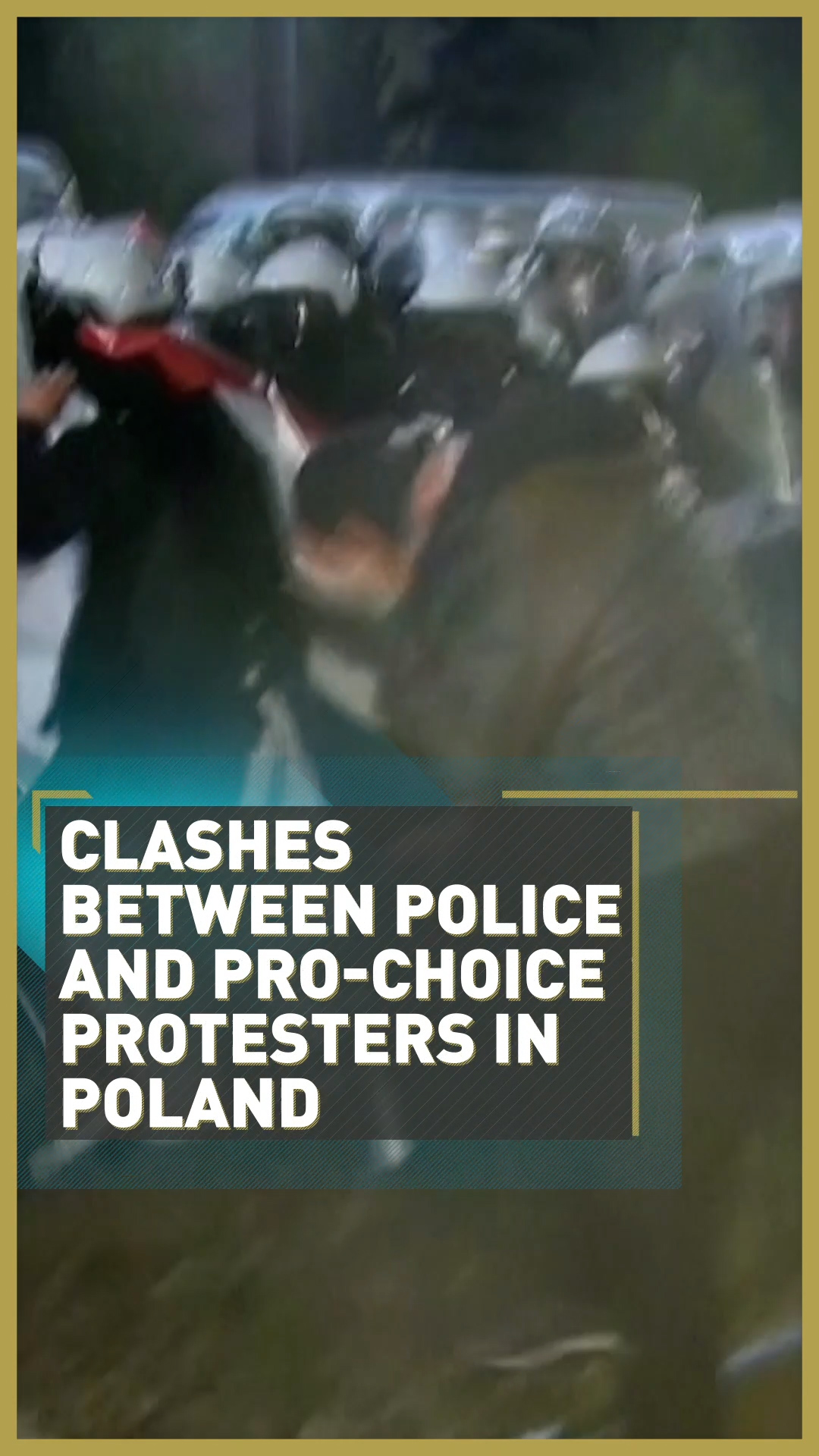Hundreds of people gathered in Warsaw, Poland's capital, to protest against a near-total ban on abortion in the country and were dispersed after clashes with the police.
00:42

The protest followed the decision of Poland's Constitutional Tribunal on Thursday to halt pregnancy terminations for fetal abnormalities, which last year represented 1,074 out of 1,100 abortions legally performed in the country. The court ruling deemed abortions for fetal defects "unconstitutional."

Protesters headed to the Law and Justice Party offices in Warsaw. /Wojtek Radwanski/AFP
Protesters headed to the Law and Justice Party offices in Warsaw. /Wojtek Radwanski/AFP

A protester carries a poster bearing the word 'torture'. /Wojtek Radwanski/AFP
A protester carries a poster bearing the word 'torture'. /Wojtek Radwanski/AFP

Riot police were called in to guard the house of Jaroslaw Kaczynski, leader of Poland's ruling party. /Wojtek Radwanski/AFP
Riot police were called in to guard the house of Jaroslaw Kaczynski, leader of Poland's ruling party. /Wojtek Radwanski/AFP

Poland has fewer than 2,000 legal abortions a year, but up to 200,000 procedures are estimated to be performed illegally or abroad. /Wojtek Radwanski/AFP
Poland has fewer than 2,000 legal abortions a year, but up to 200,000 procedures are estimated to be performed illegally or abroad. /Wojtek Radwanski/AFP
The decision sparked a public outcry across the country, but hundreds of protesters marching in front of the home of Jaroslaw Kaczynski, leader of the governing Law and Justice party, were dispersed with tear gas and pepper spray by the police.
Police said they were responding to protesters throwing stones and eggs at the officers.
Protesters disbanded in the early hours of Friday but called for more demonstrations later in the day. A police spokesperson said the force detained 15 people as a result of Thursday's protests.

Current COVID-19 restrictions in Poland limit public gathering to a maximum of up to 10 people.
Even before this court ruling, which cannot be appealed, Poland had some of the strictest laws on abortion in Europe. Besides fetal abnormalities, women could terminate a pregnancy only if there was a threat to their health or in case of rape or incest. These options are still available to Polish women, but represent fewer than 1 percent of cases of abortion in the country.
Women's rights groups estimate up to 200,000 abortions are carried out illegally or abroad.

A protester holds a sign reading, 'we've had enough'. /Wojtek Radwanski/AFP
A protester holds a sign reading, 'we've had enough'. /Wojtek Radwanski/AFP
Aleksandra Magryta, coordinator of the Great Coalition for Equality and Choice in Poland, called on EU authorities to intervene in the country to respond to such "retrogressive measures" and "breaches of the rule of law."
"We urge you to address breaches of the rule of law in all EU member states, to condemn violations of human rights including women's human rights and access to sexual and reproductive rights everywhere in the EU, and to ensure that flawed courts cannot be used to undermine the respect for human rights and EU values," she wrote.
The president of the Constitutional Tribunal, Julia Przylebska, said that allowing abortions in cases of fetal defects was a way to legalize "eugenic practices," which represents an unconstitutional form of discrimination and denies "the respect and protection of human dignity."
Poland's President Andrzej Duda has expressed satisfaction with the court ruling, saying in an interview for Warsaw newspaper Dziennik Gazeta Prawna: "I believed and believe that every child has the right to life." Duda had often expressed his opinion in interviews with local media that the "eugenic abortion" of disabled unborn children was equal to "murder."
Pressure to impose a stricter law on abortion was already made by Catholic groups in the country in 2016, when around 100,000 people protested against a tightening of the law by the Law and Justice party.
The issue was resurfaced late last year by a group of Law and Justice and right-wing MPs.
Women's rights activists warned that this decision will push women who can afford it to seek underground, illegal abortions or to go abroad to terminate their pregnancy.
Cover image: Czarek Sokolowski/AP Photo